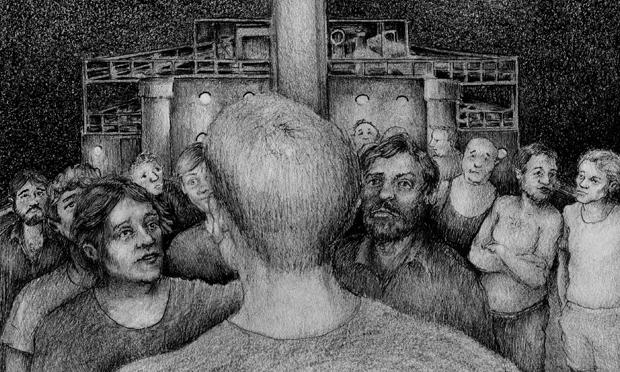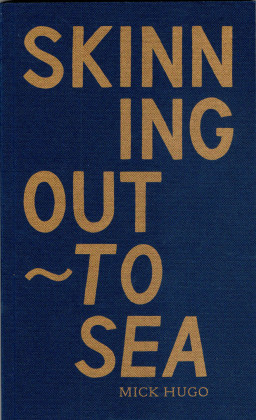Skinning Out to Sea book review – Naval gazing

An illustration from Skinning Out to Sea
At 15 and a half, having bunked off most of his final year at school, Mick Hugo ‘skinned out to sea’. In other words, he gave in to the nagging urge to ditch his native Hoxton, and joined the merchant navy. It was the early 1960s and he was leaving behind the unlikely prospect of a chance career in the film industry, in favour of ‘horizons’.
Half a century on from leaving the service, Hugo, now a builder by trade, has written 100 or so pages about his time working on the world’s oceans. His thoughts on various aspects of the seaman’s experience, which have remained roughly etched in his memory, represent a kind of challenge to conventional literature.
He writes in a raw, rugged style, untamed by any pretentious notions of a burgeoning literary life. As a result, Skinning Out To Sea is fresh and bracing, delivered in a manner befitting a boozy pub chat. Its sentences are often long and can feel unchecked, which, though occasionally jarring, contributes to a rambling style that’s lifted by Hugo’s clear knack for poetry.
Comprised of 20 short chapters and accompanied by a series of the author’s own evocative, if scruffy, sketches, the book covers myriad subjects. It details raucous exploits in far-flung ports, the day-to-day grind on deck, the social structure of the ships’ crews – which operate almost like allegorical micro-societies – and, of course, the wild exchange of pranks.
Portions of the text that stand out include recollections of when a troubled crew mate, Brummie, threw himself overboard into the black waves, and of a charismatic man-about-town, Lenny, who, it turned out, was in a relationship with a rather more unkempt male steward. The former description, which is accompanied by the original logbook account, offers stark insight into what was at stake for some at sea, while the latter is handled with a confident balance of humour and sensitivity.
Moreover, Hugo’s equating of the initial arrival of British sailors in blissful Tahiti centuries ago with taking acid for the first time is worthy of considerable praise.
While you might expect an abundance of tales of ill health and strife from a book of this sort, Skinning Out, for the most part, provides the opposite. Other than a period spent locked up in New Zealand – for reasons that remain unclear – Hugo’s personal experience comes across as largely positive and full of wonder. It was a chance to see the world, which for a working-class lad from the East End in those days was otherwise rare, and he relished it.
He describes the pleasure of jobs that entailed weeks at sea without respite: ‘If it were a longish passage, work would settle down to a relaxing pattern of day work, watch keeping and sobriety. No TV, no radio, no newspapers, regular meal times, sufficient sleep… and predominantly tropical weather with constantly changing astronomical night skies, no family responsibilities, no bills to pay… Aye, ‘twas hard!’
There is, however, a political undercurrent tracking the decline of the merchant fleet, touching on events like the seamen’s strike of 1966, which arrived in tandem with Hugo’s own political coming of age. This episode pretty much marked the end of his nautical career; but for a brief comeback with the highly desirable Australian merchant navy, he resigned himself to a life on land.
At home, Hugo would “slip back into the fold” and take his place “among the huddle on the corner”. He applied some of the skills he acquired as a seafarer to decorating for his money, but he always harboured creative ambitions, painting and sculpting away in his parents’ council flat. Now, at 70, he’s produced something special: Skinning Out To Sea is a modest triumph.
Mick Hugo will be in conversation with the writer Ken Worpole, and will also read from his book, on Thursday 10th March 2016 at 7pm.
The event will be held at Brick Lane Bookshop, and is free (including a glass of wine) but booking is essential – click here for more information and to book a place.
Skinning Out to Sea is published by Bowline Books. RRP: £10. ISBN: 9780993429507

